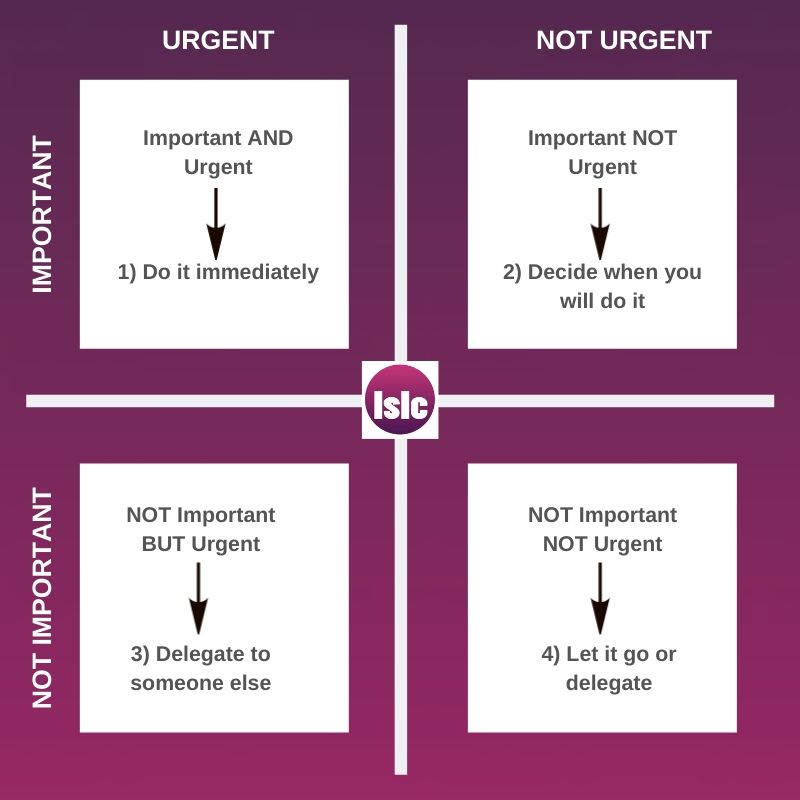As with all things in life, the way in which we approach tasks and present ourselves to the outer world often comes down to this sense of ‘not being good enough.’ Some people will deal with this by sinking into the abyss; hiding away from the world and burying their head in the sand. But not the ‘doer.’ The ‘doer’ tackles this issue head on by building this pretense of ‘worthiness’ through achieving. Every time they accomplish something, they feel good. Every time they get acknowledged for their accomplishments it’s another little dose of validation that, yes, you are a worthy human being.
Now, as marvellous as it is to have a portfolio of achievements under your belt, it is absolutely no good if these accomplishments lead you to that downward spiral of burnout. One of the key catchphrases for ‘doer’ mentality is ‘I’m soooo busy.’ I wrote about this in a previous article, and if you read that, you’ll know where your mental pitfalls are. So for good measure, we’re going to look at some practical ways you lovely ‘doer’ lot can address the work on your plate and nip that ‘busy brain mentality’ in the bud – once and for all.
Five key questions
So let’s get started. There are five key questions to ask yourself:
- Who is getting my respect?
- How am I prioritising my work?
- How am I delegating my work?
- What are my biggest time thieves and how can I address each one?
- How effectively am I managing expectations?
We’ll go through each one here – take some time to reflect on each one and really give it some thought. It can be useful to make a note of where you’re mindset and behaviours are at right now, followed by how you will change them going forward.
Self-respect vs respecting others
How much consideration are you giving to the needs of others over your own? If someone comes up to you in the office and says “I know you’re busy but could you just…” what do you do? Do you drop everything and put their needs first? Or do you respectfully say, “Yes absolutely I can help, but realistically I don’t have capacity until…[insert time and date of choice].”
All too often, we allow other people’s needs and requests to take priority over our own but this isn’t going to get us anywhere. Applying a practical mindset to assessing whether it is reasonable for you to divert onto something else is key here. It’s also really valuable to view yourself as someone who is just as important to respect and help out as those working alongside of you.
Task prioritisation
Now this can be viewed in two ways. The first is to look at how you are allocating your time. Are you getting sucked into the quick win, fast acting tasks like email management, or are you letting all of that build up whilst you immerse yourself in the juicier, more longer term projects?
The other question to consider is, what are the criteria you use to prioritise (i.e. enjoyment, need, type of project etc) and how do you build this into your working day? If you’re prioritising all the things that you enjoy as opposed to really need then you’re going to be in trouble. And it’s not going to do much for your ‘busy-brain’ headspace.
Delegation
Tying in nicely with prioritisation is something called the Eisenhower matrix, commonly used to assess priority levels and guide delegation decisions. This is particularly useful if you are new to management and haven’t quite let go of that inner control freak (just yet)…:
Give it a go now. Stop scrolling through this page and brain dump all of your current priorities onto this matrix. How does that clarify things? Of course, if you don’t have delegation responsibilities, then you can up-rank step 3, to step 2.
Time thieves
Ooh these are a joy, and there are plenty of them. Some top contenders:
- Telephone time thieves i.e. calls interrupting work
- Meeting time thieves i.e. not sticking to the agenda, ‘do i really need to be here?’
- Priority time thieves i.e. always reacting to other’s emergencies, priorities interrupted by emails and ad hoc admin
- Communication time thieves i.e. delayed responses, unclear expectations around deadlines, over-communicating
- Delegation time thieves i.e. ‘it’s quicker to do it myself’, ‘i prefer doing to thinking’, ‘will they get it right?’
- Crisis time thieves i.e. unrealistic deadlines, no view of bigger picture, over-reactions
- Indecision time thieves i.e. self doubt – ‘what if i make a mistake?’, postponing decisions.
- Drop in time thieves i.e. the need for a constantly empty inbox, inability to say no to others
- Perfectionist time thieves i.e. the need to be perfect, spending too much time on the detail, wanting to achieve everything
So if you had to list down your time thieves, what would they be? What could you do to address the top offenders?
Managing expectations
If your workload really is too much do you need to manage expectations? How could you approach this with your Manager / Project partner? Take a practical approach – this is not about you failing, this is about a practical matter of too many competing priorities.
Ultimately, it’s about ensuring the quality of work is upheld as opposed to wanting to palm off the work. Be clear about that, and be clear about the exact tasks you are juggling and how you plan to prioritise them. Clear, practical and transparent communication is always key.
And off you go…
So there you have it, five top questions to ask yourself that will give you the strategy you need to address your ‘busy-brain’ mentality in a whole new, and let’s face it – more practical way. A practical over emotion-led focus is always going to be a more a useful choice – well most of the time.
So take those away and, along with the tips from my previous blog post, notice how things start to change. Make a note of your top three positive changes at the end of each day to really get a sense of how much influence you really do have when you put your mind to it.


